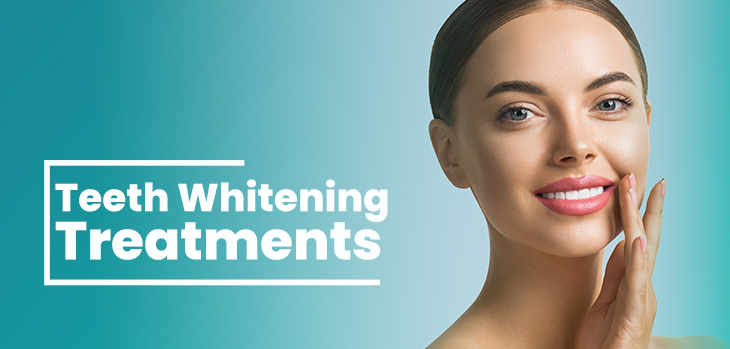


Aug 03,2022
Teeth discolouration or staining can occur for several reasons. Different teeth whitening options are available. Although some teeth whitening options are unsafe, you can opt for many options that safely whiten the teeth.
In-office and at-home teeth whitening products are available. Teeth whitening may have certain side effects, but most conventional options are safe, provided you follow the product's direction and consult your dentist.
You can have stained teeth due to several reasons, but two types of teeth stains occur with different causes.
Extrinsic teeth discolouration affects only the outer tooth surface. This discolouration occurs from smoking, some beverages and foods. Red wine, coffee, tea, tobacco and foods with dyes are common culprits of this teeth staining.
Teeth whitening toothpaste can reverse this type of staining.
Intrinsic discolouration affects the inner part of the teeth. It often results from childhood illnesses, tooth trauma, ageing, medication or infection. This type of discolouration requires professional bleaching to restore the teeth colour.
The teeth whitening option will depend on the cause of the staining.
Several products and methods are available for teeth whitening, and it is easy to get confused or question the safety of these teeth whitening options.
Three main categories of teeth whitening treatments are available:
You can choose teeth whitening treatment based on the following factors.
Discussing teeth whitening options with your dentist is important for your dental health. Your dentist will offer a treatment plan to suit your needs specifically. The dentist will likely discuss different methods and products to whiten your teeth during your dental visit.
Safe teeth whitening may take a while to achieve your desired result, depending on your type of teeth discolouration and preferred teeth whitening treatment.
The dentist may opt for different methods of professional teeth whitening, either at home or in-office treatment. Generally, the teeth whitening methods use a bleaching agent containing carbamide peroxide. In-office teeth whitening
In-office teeth whitening is the quickest option to remove teeth discolouration and stains. The effect may also last a longer period. The treatment usually requires a few dental visits, each lasting for about an hour.
The quick whitening effect is due to the hydrogen peroxide concentration in the products, which is higher than the over-the-counter products.
In-office teeth whitening is also ideal for people with abfraction lesions and receding gums. The dentist may apply a special light to speed up the whitening process, but limited evidence is available to support the effectiveness of light application in teeth whitening.
Your dentist may offer you teeth whitening products for home use. This includes custom-fitted trays and whitening gel, which you use for minimum 6 hours per night daily for a few weeks or as the dentist recommends.
Over-the-counter teeth whitening products are available to remove teeth stains. Unlike the dentist-administered products, OTC teeth whitening products do not have carbamide peroxide, and the concentration of the whitening agent is less, making them less effective for intrinsic teeth discolouration. The teeth whitening process may also take a longer time.
Some OTC teeth whitening products have gotten approval for use, making them safer for use, but others haven't been approved. Ensure you follow the manufacturer's instructions.
Whitening toothpaste does not contain carbamide peroxide, but they use different substances like chemical blue covarine and abrasives to remove surface stains. Whitening toothpaste may take a while to give noticeable results, but those containing blue covarine may show the result after one use because the chemical makes the teeth look whiter.
Teeth-whitening strips are available as OTC whitening products. They contain less hydrogen peroxide concentration. Most require application 1 – 2 times daily for a set period, as instructed by the manufacturer.
Different teeth whitening strips are available with varying concentrations of the bleaching agent.
Activated charcoal is a common homemade teeth whitening method. Homemade teeth whitening methods have no scientific backing to prove their effectiveness in teeth whitening. Ensure you discuss these teeth whitening options with your dentist before using them to prevent irreversible teeth damage.
Teeth whitening is safe, but you may experience certain side effects such as:
The teeth usually become more sensitive after teeth whitening. The soreness may occur after the first or send teeth whitening session and may subside gradually. Your dentist may recommend sodium fluoride and potassium nitrate gel products to treat the sensitivity.
Gingival irritation is also common following teeth whitening. This occurs when the gums become irritated due to contact with the whitening product, but it subsides after a while.
Teeth whitening doesn't give a permanent result, so periodic teeth whitening for intrinsic and extrinsic discolouration is necessary.
Teeth whitening is only for the natural teeth, meaning people with dental restorations like dentures, crowns, bridges, or implants may need to consult the dentist before teeth whitening.
Teeth whitening treatment isn't advisable if you're undergoing dental work or have active cavities.
Your oral hygiene, eating, and drinking habits will affect the long-term effect of your teeth whitening treatment. After whitening teeth, your teeth will be more prone to staining from certain foods and beverages such as coffee, tea, and tomato sauce.
Brushing your teeth or rinsing your mouth immediately after taking drinks or foods with colouring agents will prevent stains from settling on your tooth surface and reduce plaque accumulation.
For safe teeth whitening in Harley Street, visit Smile Works Dental or call us on 020 7183 4091 to schedule an appointment with our experienced dentist to remove intrinsic and extrinsic teeth stains.